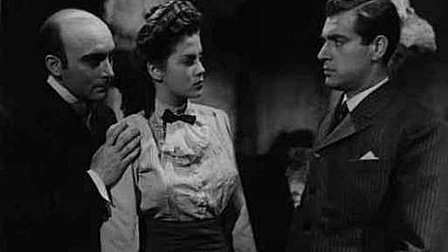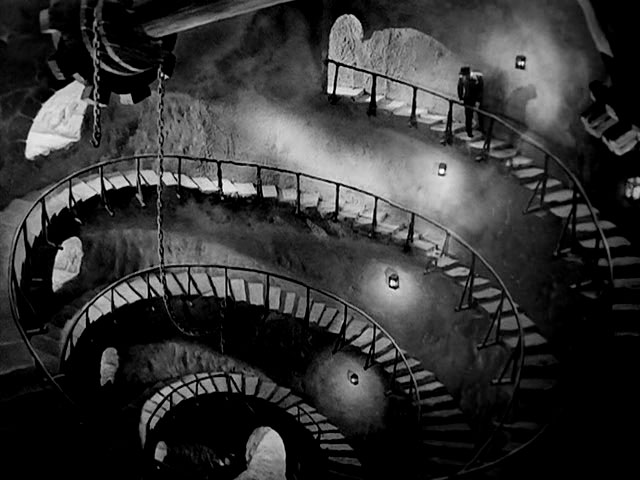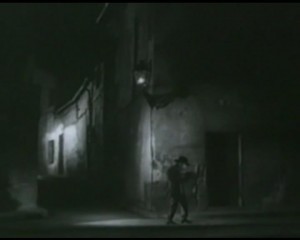From the Chicago Reader (October 26, 1987). — J.R.


Edgar Neville — an aristocratic Republican filmmaker and writer who was friends with everyone from Lorca and Chaplin to Ortega y Gasset and Lacan — is one of the great undiscovered auteurs of the Spanish cinema. This remarkable turn-of-the-century fantasy, which suggests an eerie encounter between the tales of Borges and the early melodramas of Feuillade and Lang, starts off as a supernatural mystery as the hero (Antonio Casal) is persuaded by a one-eyed ghost to solve the case of his murder. This leads him first to the ghost’s niece (Isabel de Pomes) and eventually to a hidden underground city beneath the old section of Madrid that contains an ancient synagogue and is presided over by hunchbacked counterfeiters. Based on a novel by Emilio Carrere, this hallucinatory fiction ends rather abruptly and never manages to account for all the mysteries it uncovers, but as pure, primal storytelling it is as creepy a spellbinder as one could wish for (1944). (JR)


On November 27, 2017 I received the following email, sent from Spain:
You refer to Edgar Neville in your online review of TOWER OF THE SEVEN HUNCHBACKS as a “Republican”. He was actually one of the other guys, if you know what I mean. As someone who likes much of the output of such official Francoist filmmakers as Rafael Gil, José Luis Sáenz de Heredia (a former Buñuel associate who made RAZA, co-written by Franco himself and hardly the director’s best film) and Antonio del Amo (actually a Republican who found a place in Francoist cinema thanks to his friendship with Rafael Gil), I am in no position to hold that against him. The fact, however, is that Neville supported the Nationals during the Civil War. So, in fact (to mention a character you identify as a friend of his) did Ortega y Gasset, however ambiguously.
One other thing: while you identify the two romantic leads (Antonio Casal and Isabel de Pomés) in parentheses, you do not identify the leading actress’s father, who plays the one-eyed ghost: the former silent film actor Félix de Pomés, also an occasional writer and director and a frequent dubber, not to say a former football player and fencer (competing as such at the Olympics in the 1920s). Despite his somewhat Lionel Atwill-ish screen persona, he played a working-class hero in Antonio Sau’s anarchist film AURORA DE ESPERANZA (1937) (which I intend to view now).
The lead hunchback in Neville’s film, for the record, is played by the bald, thin-lipped character actor Guillermo Marín, the boring husband in Neville’s LA VIDA EN UN HILO (1945). Marín had many good roles, ranging from the priest-hero’s atheist friend in Rafael Gil’s Catholic drama LA FE to the ageing Republican in Jaime Chávarri’s Civil War drama LAS BICICLETAS SON PARA EL VERANO (1984).
Anyway, I shall humbly recommend such other Neville movies as the aforementioned LA VIDA EN UN HILO, EL CRIMEN DE LA CALLE BORDADORES, EL SEÑOR ESTEVE (which some Nevillians seem to dislike, maybe because it’s not set in Madrid as most of his films are: it’s taken from a Rusiñol play/novel and is about Catalan pragmatism) and EL BAILE. Also EL PRESIDIO, his Spanish-language version of THE BIG HOUSE (with Juan de Landa in the Wallace Beery role). I am less fond of DOMINGO DE CARNAVAL. I look forward to watching others.
Well, I won’t bore you any further as I’m sure you get lots of mail and have many things in your mind. I hope I haven’t bothered you.
Best regards,
Philip Dittmann
P.S. I wanted to send you this straight to your site but this appears not to be possible.




